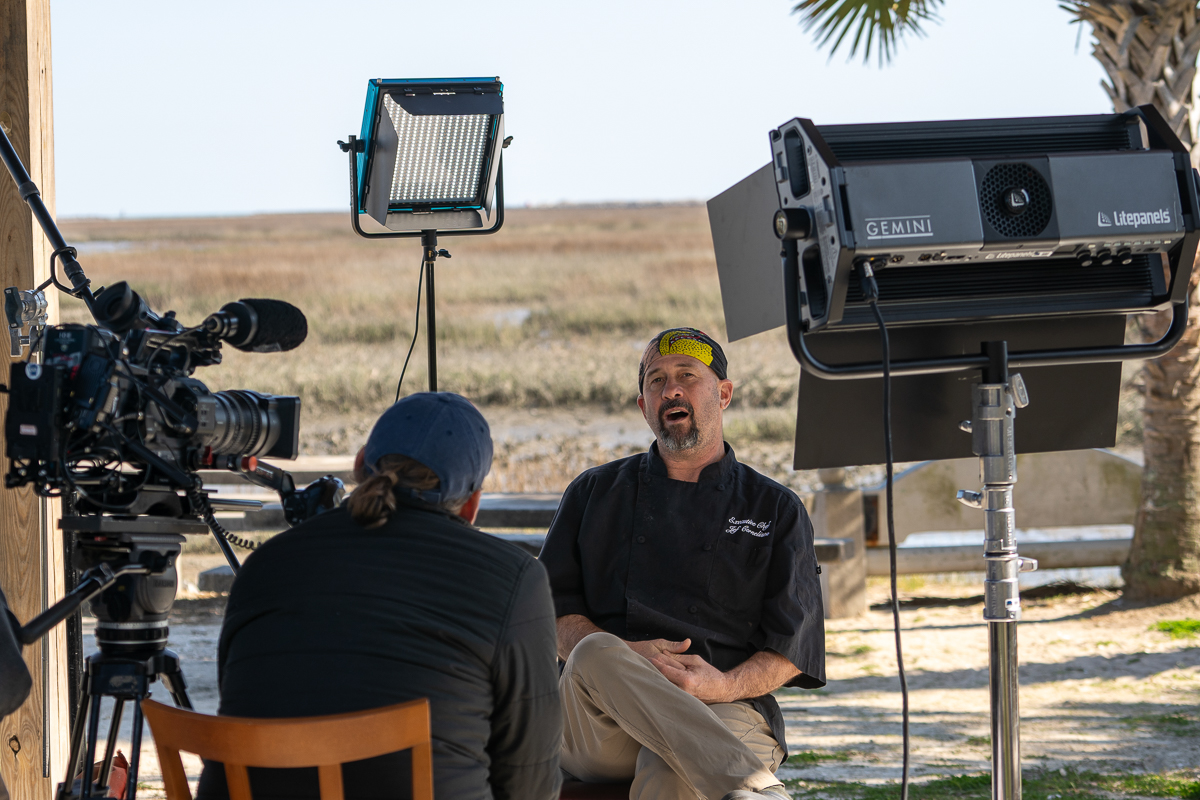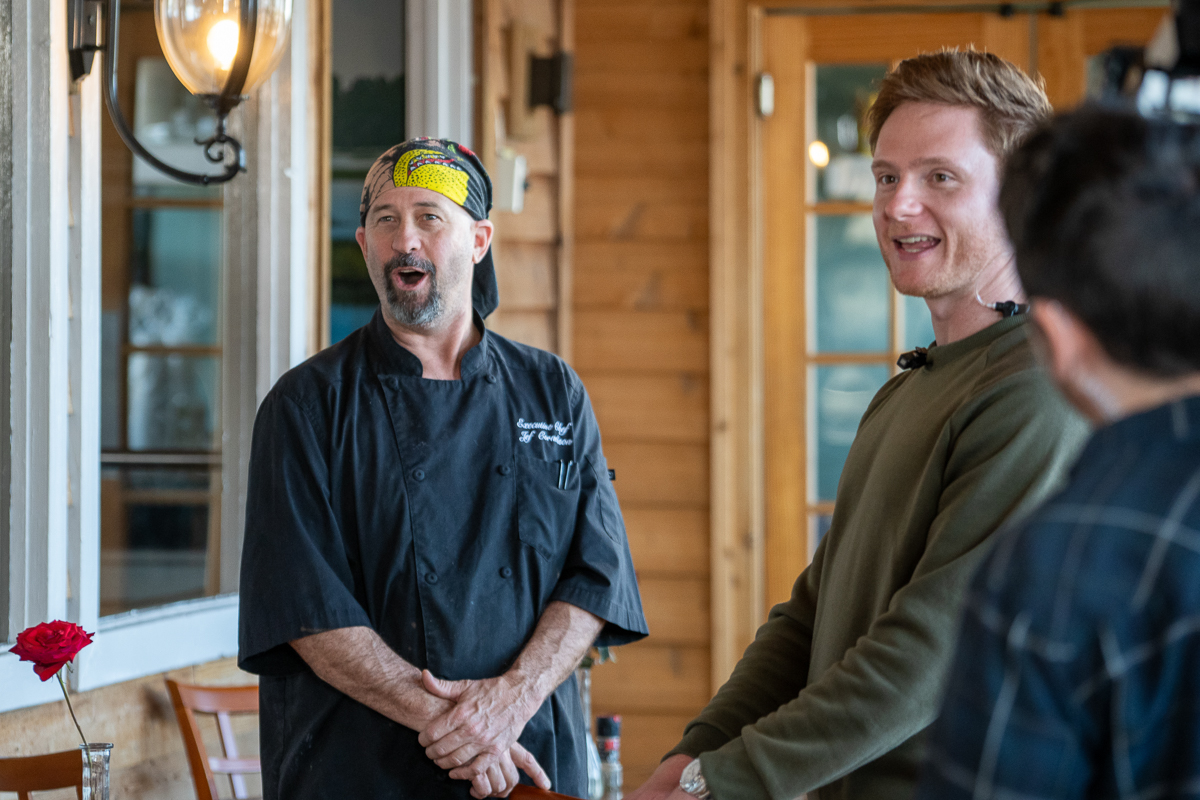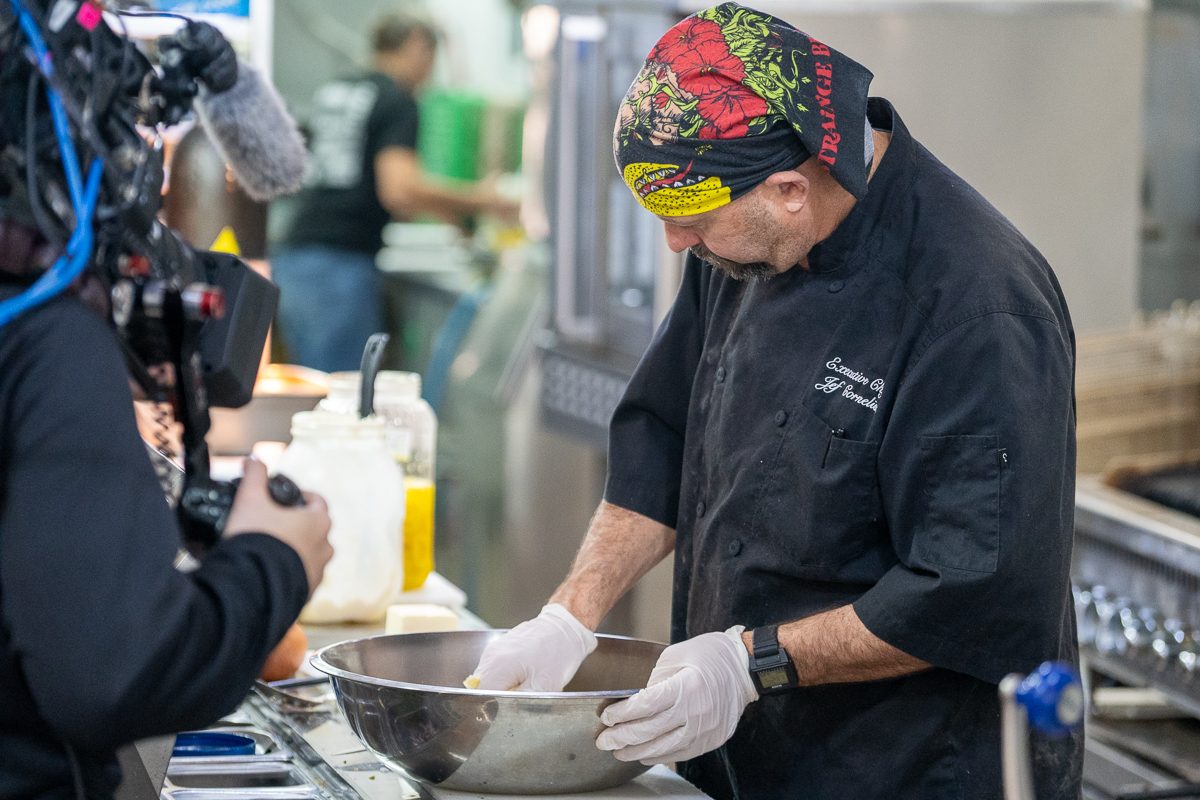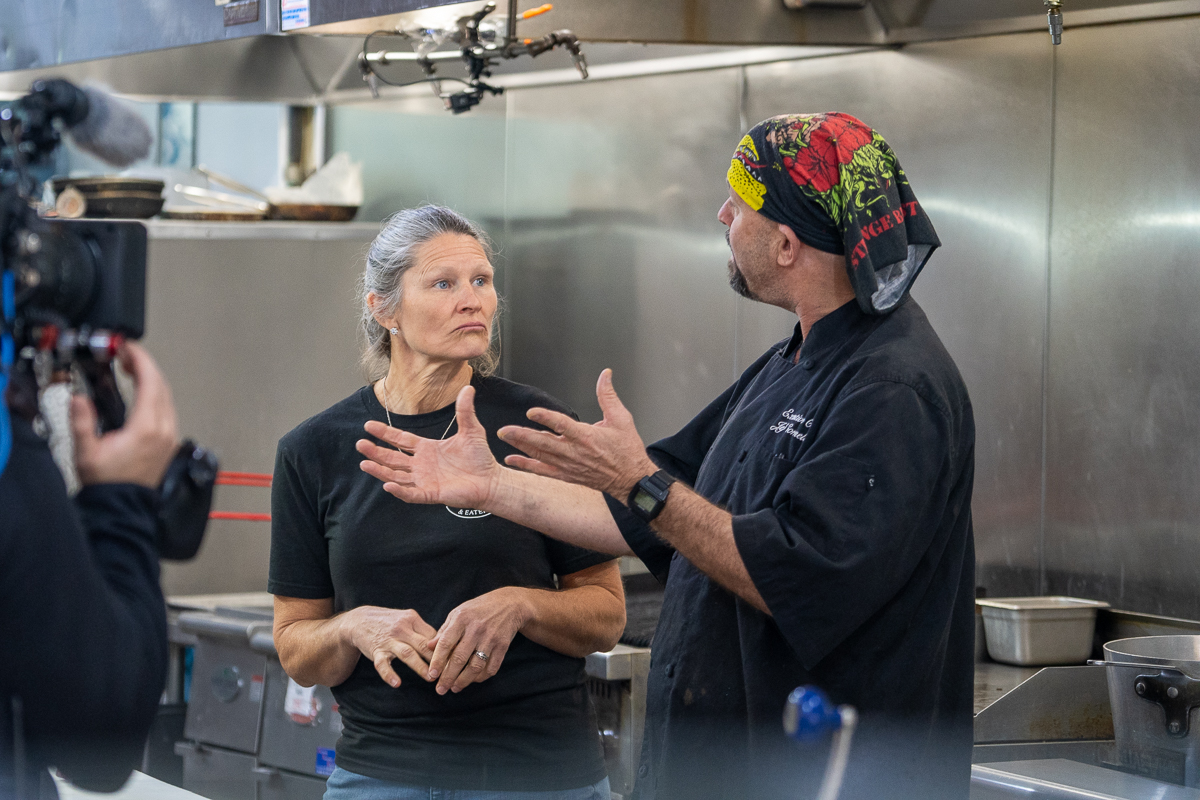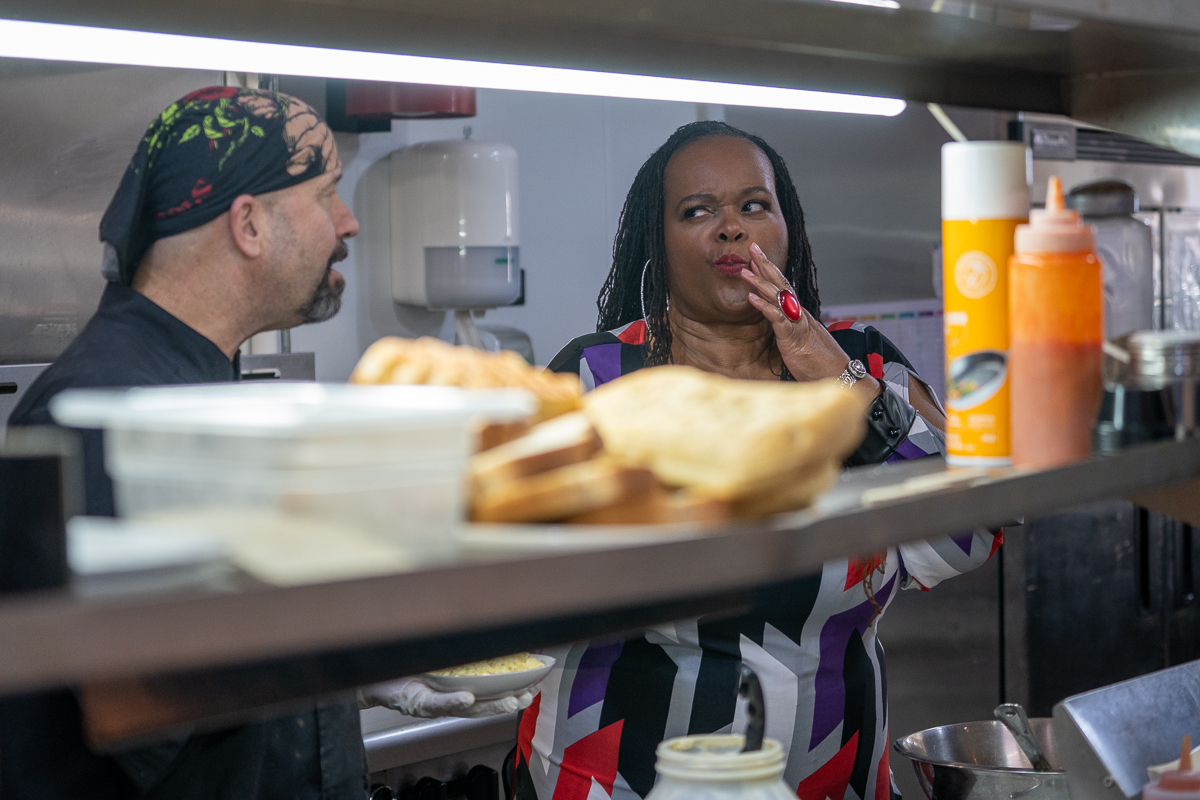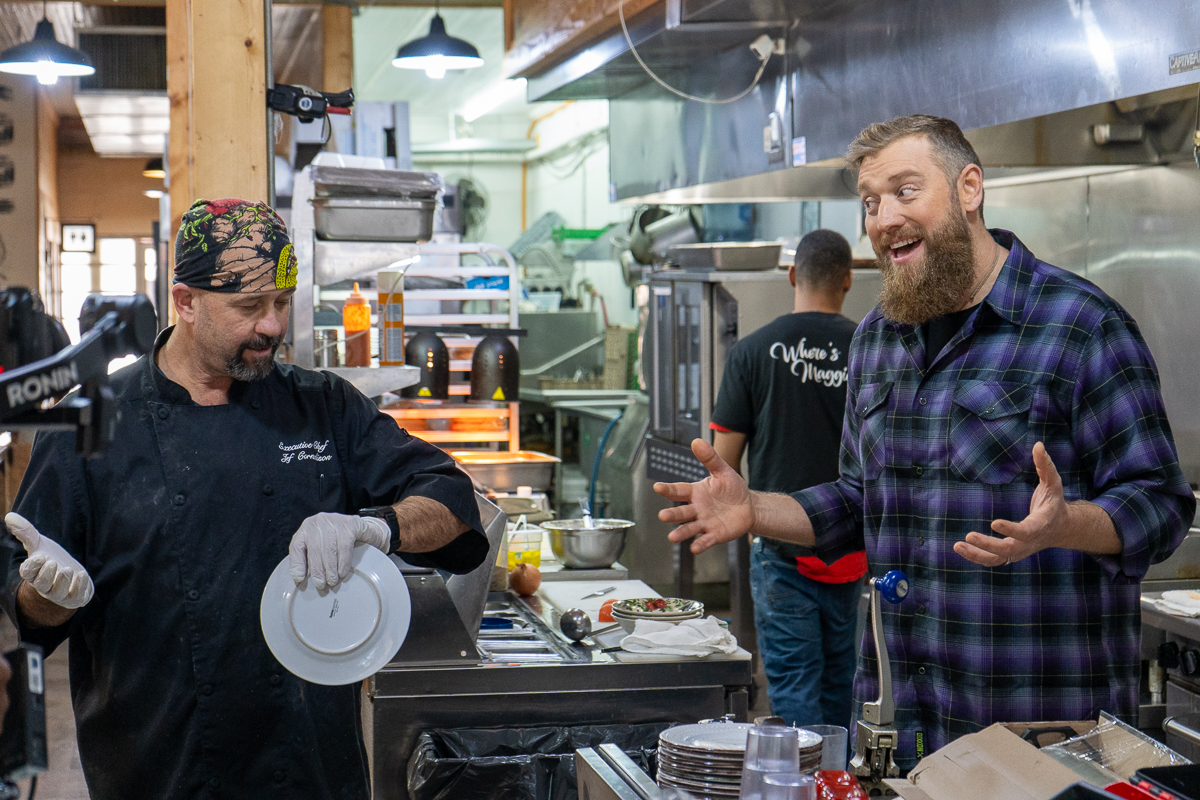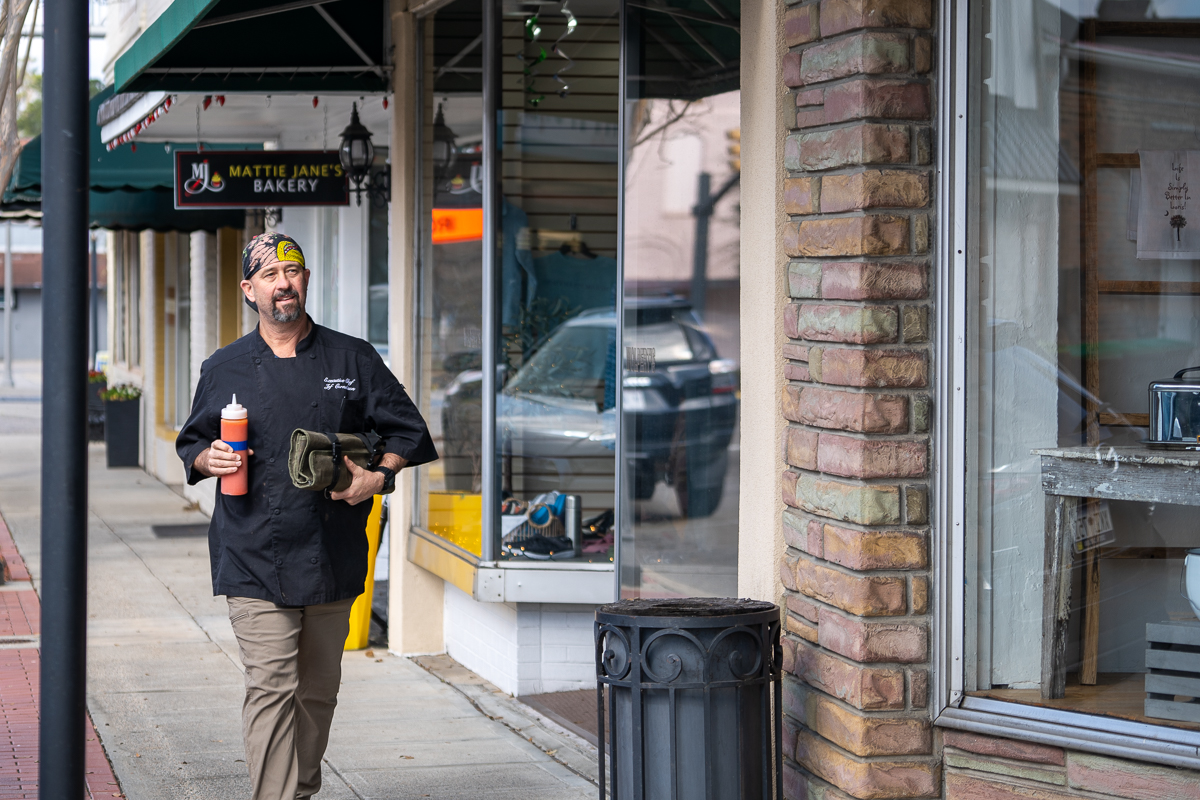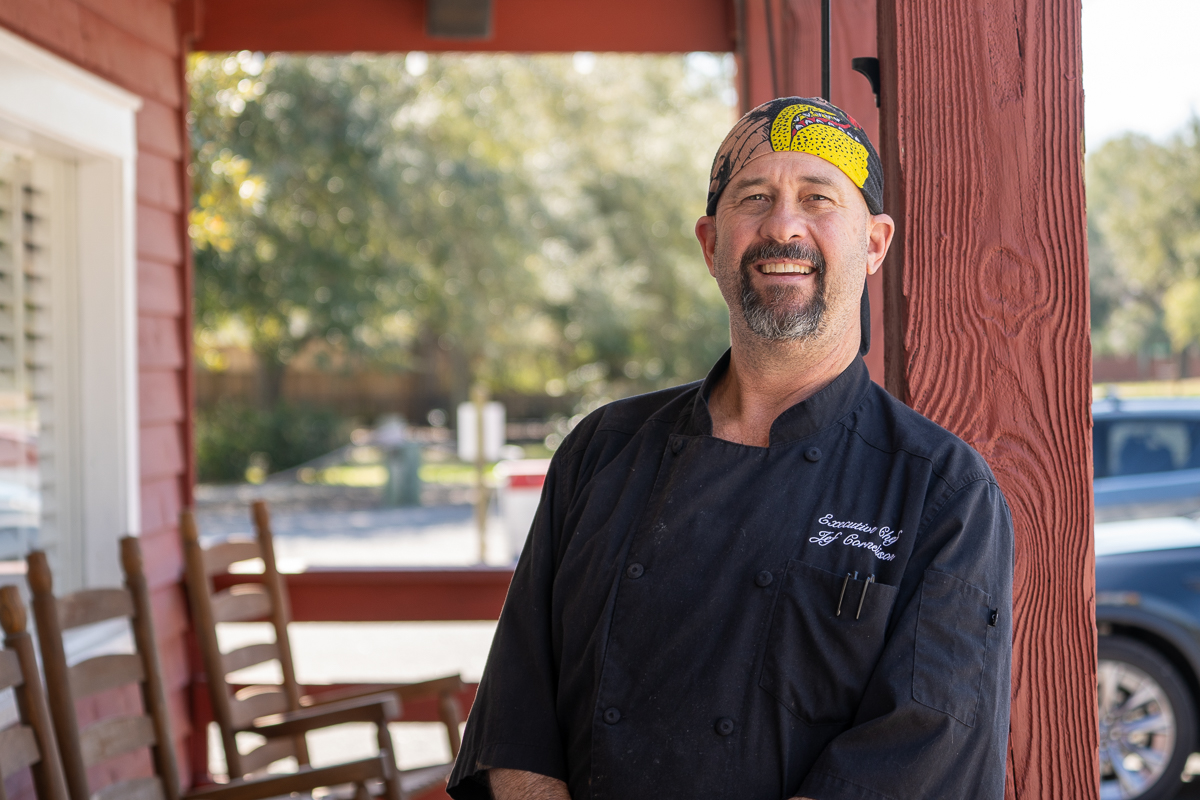
Chef Jef Cornelison
Jef Cornelison learned about food at the feet of women in his life and became committed to make food founded in love and sustained by traditions.
About Chef Jef Cornelison
By Johanna Wilson Jones
It’s a warm Wednesday in June, and folks are filtering into Inlet Prohibition Company in Murrells Inlet.
Most of them are dressed casually and appear chipper. Outside the large gray building at 4891 U.S. 17 Business, the phrase “Good Food And Bad Advice” is emblazoned in black against the gray paint – except for “BAD,” written in red. The slogan gives visitors, new and old, a hint about the hip, relaxed character of the eatery.
The inside is spacious and airy, with tables and booths. Pop music throbs through speakers as some patrons sit on the deck facing the Murrells Inlet Marsh Walk. It is a clear day and azure skies rule over the lush green that covers the marsh.
This domain is one of two where Jef Cornelison works as a chef. He is also a chef at the sister property, Hot Fish Club, at 4911 US 17 Business in Murrells Inlet.
If that isn’t enough, he is a general partner for the Hot Fish Club and an operating partner at Inlet Prohibition Company. He happens to be working at the latter on this particular Hump Day.
Eyes watch as he whizzes back and forth in the hot kitchen, which can reach 125 degrees in the summer.
Look! He is making hotdogs, punched up with house-made spicy chili and coleslaw. Look! There he is carefully building tuna poke on a crispy tostada.
“He manages his stress well,’’ said Allie Cain, a hostess and former prep cook at Inlet Prohibition Company, called IPC for short. “Our old manager used to break down and cry…but I’ve never seen Jef do that, and I know he has a lot on his plate.’’
Cornelison knows how to operate under pressure. There was a version of him, however, that folded under the heavy loads that the restaurant industry can place on anyone’s shoulders.
He once enjoyed indulging in alcohol and drugs, a reality that started in his 20s.
Today, as a man in his 50s, he is mighty in perseverance and resolve. Cornelison is a new creature, a better chef, and a more complete and accomplished man. He has been sticking to sobriety for more than nine years.
“If I can get sober and not die, anybody can,’’ he said. “You can do this job without the booze and drugs.”
Taste You Can Relish By A Kind Cook
Evan Longacre, a server at Inlet Prohibition Company, said Cornelison is a grand chef.
“He just made a new dish – sesame-seared tuna,’’ Longacre said. “It’s the best thing I ever had…It’s delicious. I love it. It’s got a little sweet, it’s got a little spicy. It’s got a little tangy to it.”
The large wedge of tuna has a sesame-seed crust topped with a mound of cucumber and mango salad. Below the tuna is a bed of fried rice with edamame touching its edges.
Longacre also credits Cornelison for being a superb supervisor.
“He is the best manager I’ve ever had,’’ he said. “I’ve worked in a couple of restaurants. He is a down-to-earth guy. He treats us all like humans. I have no complaints.”
Phillip Bates, the owner of both restaurants, has known Cornelison for 20 years. They met when Cornelison was a seafood buyer for Sysco.
“I guess he doesn’t have a mean bone in his body,’’ Bates said. “Sometimes, he is too nice.”
Bates admires Cornelison for several reasons, including his work ethic and the time he takes to mentor others.
“He has changed his entire life,’’ Bates said. "He works with people who have addictions. He may care more about that than cooking.”
Bates said Cornelison is respected by him and others because he will do whatever job is necessary.
If a toilet is stopped up, he is off to it with a plunger. If a prep cook doesn’t show up, he jumps in and handles the work all while still doing his job.
The Chef Wonderful Women Built
Cornelison is a man with a motive on a mission – he cooks because he enjoys making food and carrying the mantle the women in his life embodied for generations.
The menus he invents are part of his way of continuing the historical convention for food and how it’s prepared.
“The tradition of cooking has all but disappeared,’’ said Cornelison, whose first job at 12 was selling barbecue sandwiches to 85,000 folks at Sandford Stadium, home to the University of Georgia Bulldogs. He is still a devout fan. “When you have to make things, when you have to put things together, you think about how they work. Then when you feel like you’re carrying on a tradition – there’s some love in there. You are honoring (your elders and their traditions).”
That’s why so much of the meu embodies food folks feel and love, including Southern classics like shrimp and grits and other food where a little more time and attention are required.
“I enjoy cooking like grandma and mama did,’’ said Cornelison, who has cooked professionally for over 30 years. “I like that. I like making collard greens. I like cooking things I remember smelling as a kid.”
The South is known for its cultural riches and storied traditions found in the nooks and crannies of small towns and big cities.
Our music, mores, and meals have always had a way of grabbing people’s hearts and making them part of their passions.
People with no Southern roots know that some of the best food in the world is found below the Mason-Dixon Line.
Cornelison was rooted and raised in Georgia, where there was never a shortage of talented and resourceful women who could cook.
Vallye Manley, his great-grandmother, was one of them. She was a member of one of the biggest families in Griffin, GA. Her castle was a farmhouse built in the 1820s. There, in her kitchen, she planted seeds for cooking into the soul of her grandson.
“It was farm country,’’ Cornelison said. “They grew sweet potatoes and corn. They had cows and pigs and a little bit of everything.”
He remembers the homemade biscuits his great-maternal grandmother, whom he called “Ma Vallye” would make. He remembers the big wooden bowl she used.
He also thinks of Liz. Cornelison doesn’t recall her last name, but he fondly remembers her as a sweet African American woman who prepared much of the food for them in Griffin.
“Liz would put all this big spread out, and that woman would have a serving dish and a spoon in her hand,’’ Cornelison said. “As soon as you finished something, you would get more on your plate. You had to go, ‘No, no, no. I can’t eat another bite.’”
His paternal grandmother was a huge influence on him, too. Her name was Eleanor Cornelison. She lived in Athens, Ga., where he was born.
He called her “Ma’am” because he constantly heard adults saying, “Yes, Ma’am,” to her.
“I was in charge of chopping things, and she had one of the first food processors,’’ he said. “This was back in the early 70s, and I was in charge of making salads. So, I would stand in the corner and make my little salads with the food processor for us to have with dinner.”
Eleanor Cornelison grew up during the Great Depression, and she developed an array of food hacks to make meals stretch.
“When she would brown ground beef, she would brown cornmeal with it because (she) didn’t have enough money for two pounds of ground beef,’’ he said. “So (she) would add cornmeal to it because when it browns up it kind of looks like corned beef.”
Another ingenious technique she would use to make bleu cheese dressing affordable was to use a small amount of bleu cheese and add cottage cheese to it to make it last longer.
“Ma’am” managed to pack piles of memories into his mind before she left Earth.
“She would pick me up every Friday, and we would go out to dinner,’’ he said. “I would spend the night with her, and I remember we used to watch “The Love Boat,’’ “Fantasy Island,” “Quincy,’’ and “The Rockford Files.””
What impacted him most, however, was the memories culled from time in her kitchen.
“She was a great cook (and baker),’’ he said. “She made me cherry pies until I couldn’t eat any more cherry pies. She took me out once and told me to pick all the blackberries I wanted.”
Cornelison came back with a bountiful supply, and she made him a delectable blackberry cobbler. It wasn’t as big as he thought it would be – that’s when he learned how much fruits and vegetables can shrink during the cooking process.
Truly, the women in his life made him the chef he is today and cemented his lifelong commitment to always cook and carry on their traditions.
His mother, Deborah Cornelison, lived in Columbia and was one of his most prized cooking partners.
They cooked the day before she died on March 3, 2016.
“We cooked roasted chicken,’’ he said. “She used to love whole roasted chicken. So, we had roasted chicken, roasted potatoes, and vegetables. Yep, we cooked together all the time.”
The pancake recipe he has is hers. A lot of what he does in his career is culinary fruit he picked from the trees of women who taught him tons about cooking.
“On our menu right now, we have a field pea succotash,’’ he said. “Ma Vallye used to make green tomato relish, and I love green tomato relish field peas are one of my favorite dishes.”
His mother and her sister-in-law, Toni Parr would get together about twice a year to make green tomato relish. It was a task that required two days to produce enough green tomato relish to last the family for about six to eight months.
“They would drink vodka tonics with cranberry and just get absolutely hammered and make green tomato relish,’’ he said. “Now, I make green tomato relish in the summertime and pickle okra – and we do fresh pickles here. So, a lot of what I do is rooted in the things I learned from a bunch of wonderful, Southern women.”
